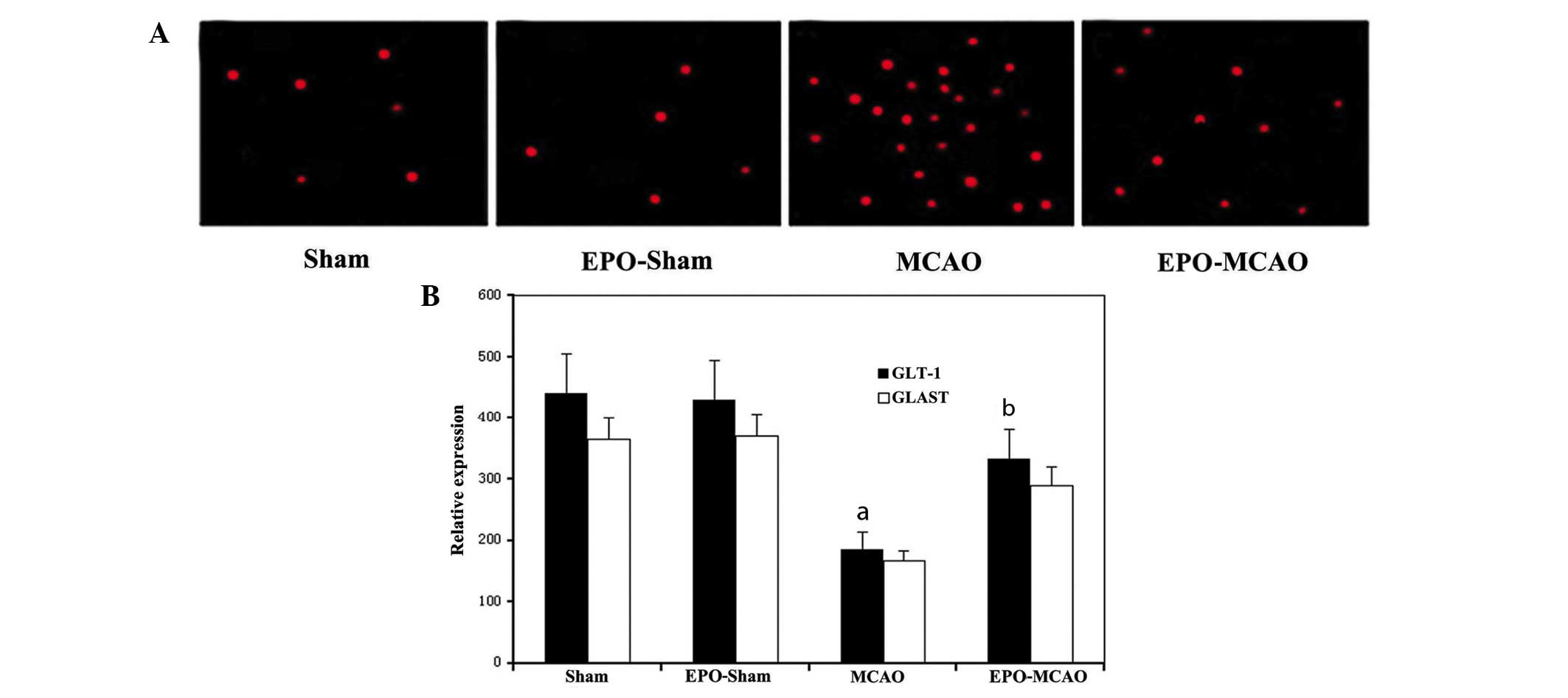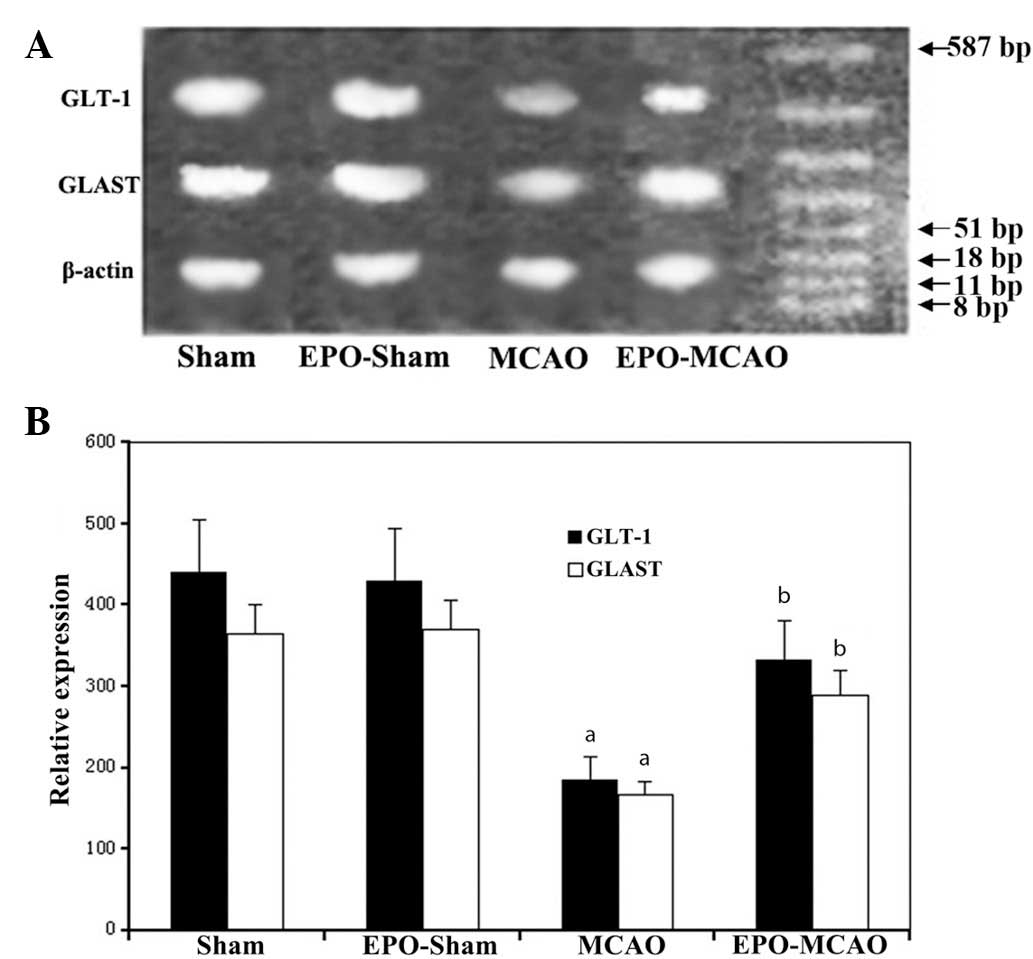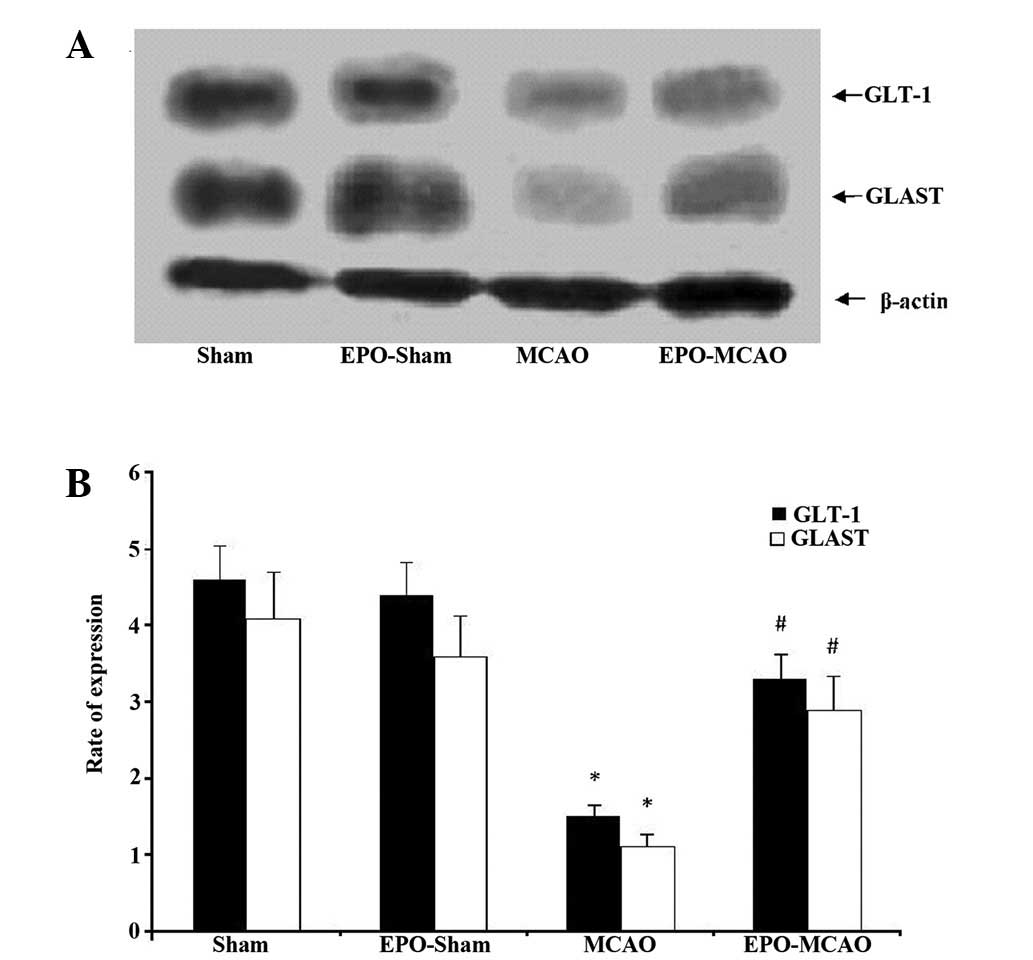|
1
|
Koudstaal PJ, Stibbe J and Vermeulen M:
Fatal ischaemic brain oedema after early thrombolysis with tissue
plasminogen activator in acute stroke. BMJ. 297:1571–1574. 1988.
View Article : Google Scholar : PubMed/NCBI
|
|
2
|
Clark RK, Lee EV, White RF, Jonak ZL,
Feuerstein GZ and Barone FC: Reperfusion following focal stroke
hastens inflammation and resolution of ischemic injured tissue.
Brain Res Bull. 35:387–392. 1994. View Article : Google Scholar : PubMed/NCBI
|
|
3
|
Mitani A and Kataoka K: Critical levels of
extracellular glutamate mediating gerbil hippocampal delayed
neuronal death during hypothermia: Brain microdialysis study.
Neuroscience. 42:661–670. 1991. View Article : Google Scholar : PubMed/NCBI
|
|
4
|
Keelan J, Bates TE and Clark JB:
Differences in the amount of glutamate released by neonatal and
adult synaptosomes under conditions of in vitro
ischaemia/reperfusion. Biochem Soc Trans. 24:425S1996. View Article : Google Scholar : PubMed/NCBI
|
|
5
|
Semkova I, Schilling M, Henrich-Noack P,
Rami A and Krieglstein J: Clenbuterol protects mouse cerebral
cortex and rat hippocampus from ischemic damage and attenuates
glutamate neurotoxicity in cultured hippocampal neurons by
induction of NGF. Brain Res. 717:44–54. 1996. View Article : Google Scholar : PubMed/NCBI
|
|
6
|
Perego C, Vanoni C, Bossi M, Massari S,
Basudev H, Longhi R and Pietrini G: The GLT-1 and GLAST glutamate
transporters are expressed on morphologically distinct astrocytes
and regulated by neuronal activity in primary hippocampal
cocultures. J Neurochem. 75:1076–1084. 2000. View Article : Google Scholar : PubMed/NCBI
|
|
7
|
Fukamachi S, Furuta A, Ikeda T, Ikenoue T,
Kaneoka T, Rothstein JD and Iwaki T: Altered expressions of
glutamate transporter subtypes in rat model of neonatal cerebral
hypoxia-ischemia. Brain Res Dev Brain Res. 132:131–139. 2001.
View Article : Google Scholar : PubMed/NCBI
|
|
8
|
Han BC, Koh SB, Lee EY and Seong YH:
Regional difference of glutamate-induced swelling in cultured rat
brain astrocytes. Life Sci. 76:573–583. 2004. View Article : Google Scholar : PubMed/NCBI
|
|
9
|
Harvey BK, Airavaara M, Hinzman J, Wires
EM, Chiocco MJ, Howard DB, Shen H, Gerhardt G, Hoffer BJ and Wang
Y: Targeted over-expression of glutamate transporter 1 (GLT-1)
reduces ischemic brain injury in a rat model of stroke. PLoS One.
6:e221352011. View Article : Google Scholar : PubMed/NCBI
|
|
10
|
Calapai G, Marciano MC, Corica F, Allegra
A, Parisi A, Frisina N, Caputi AP and Buemi M: Erythropoietin
protects against brain ischemic injury by inhibition of nitric
oxide formation. Eur J Pharmacol. 401:349–356. 2000. View Article : Google Scholar : PubMed/NCBI
|
|
11
|
Tang Z, Sun X, Shi Q, Wang X, Xie Y, Huo
G, Zhou S and Liao Z: Beneficial effects of carbamylated
erythropoietin against oxygen-glucose
deprivation/reperfusion-induced astrocyte swelling, Proposed
molecular mechanisms of action. Neurosci Lett. 530:23–28. 2012.
View Article : Google Scholar : PubMed/NCBI
|
|
12
|
Longa EZ, Weinstein PR, Carlson S and
Cummins R: Reversible middle cerebral artery occlusion without
craniectomy in rats. Stroke. 20:84–91. 1989. View Article : Google Scholar : PubMed/NCBI
|
|
13
|
Shimakura A, Kamanaka Y, Ikeda Y, Kondo K,
Suzuki Y and Umemura K: Neutrophil elastase inhibition reduces
cerebral ischemic damage in the middle cerebral artery occlusion.
Brain Res. 858:55–60. 2000. View Article : Google Scholar : PubMed/NCBI
|
|
14
|
Patt A, Rutherford RB, Pearce WH and
Repine JE: Cerebral ischemia-reperfusion injury in the gerbil. J
Surg Res. 42:462–466. 1987. View Article : Google Scholar : PubMed/NCBI
|
|
15
|
Tausompos C and Panoulis C: Tauοutouzas K
Zetaografos G and Papalois A: The effect of the antioxidant drug
“U-74389G” on oophoritis during ischemia reperfusion injury in
rats. Antiinflamm Antiallergy Agents Med Chem. 13:103–107. 2014.
View Article : Google Scholar : PubMed/NCBI
|
|
16
|
Lehrke M and Lebherz C: AAV-mediated gene
therapy for atherosclerosis. Curr Atheroscler Rep. 16:4342014.
View Article : Google Scholar : PubMed/NCBI
|
|
17
|
Schlegel A, Kron P, Graf R, Dutkowski P
and Clavien PA: Warm vs. Histopathology. J Hepatol. 61:1267–1275.
2014. View Article : Google Scholar : PubMed/NCBI
|
|
18
|
Brines ML, Ghezzi P, Keenan S, Agnello D,
de Lanerolle NC, Cerami C, Itri LM and Cerami A: Erythropoietin
crosses the blood-brain barrier to protect against experimental
brain injury. Proc Natl Acad Sci USA. 97:10526–10531. 2000.
View Article : Google Scholar : PubMed/NCBI
|
|
19
|
Shin T, Ahn M, Moon C and Kim S:
Erythropoietin and autoimmune neuroinflammation, Lessons from
experimental autoimmune encephalomyelitis and experimental
autoimmune neuritis. Anat Cell Biol. 45:215–220. 2012. View Article : Google Scholar : PubMed/NCBI
|
|
20
|
McCook O, Georgieff M, Scheuerle A, Möller
P, Thiemermann C and Radermacher P: Erythropoietin in the
critically ill, Do we ask the right questions? Crit Care.
16:3192012. View
Article : Google Scholar : PubMed/NCBI
|
|
21
|
Grewer C, Gameiro A, Zhang Z, Tao Z,
Braams S and Rauen T: Glutamate forward and reverse transport, From
molecular mechanism to transporter-mediated release after ischemia.
IUBMB Life. 60:609–619. 2008. View
Article : Google Scholar : PubMed/NCBI
|
|
22
|
Akbar MT, Torp R, Danbolt NC, Levy LM,
Meldrum BS and Ottersen OP: Expression of glial glutamate
transporters GLT-1 and GLAST is unchanged in the hippocampus in
fully kindled rats. Neuroscience. 78:351–359. 1997. View Article : Google Scholar : PubMed/NCBI
|
|
23
|
Persson M and Rönnbäck L: Microglial
self-defence mediated through GLT-1 and glutathione. Amino Acids.
42:207–219. 2012. View Article : Google Scholar : PubMed/NCBI
|
|
24
|
Romera C, Hurtado O, Mallolas J, Pereira
MP, Morales JR, Romera A, Serena J, Vivancos J, Nombela F, Lorenzo
P, et al: Ischemic preconditioning reveals that GLT1/EAAT2
glutamate transporter is a novel PPARgamma target gene involved in
neuroprotection. J Cereb Blood Flow Metab. 27:1327–1338. 2007.
View Article : Google Scholar : PubMed/NCBI
|
|
25
|
Digicaylioglu M and Lipton SA:
Erythropoietin-mediated neuroprotection involves cross-talk between
Jak2 and NF-kappaB signalling cascades. Nature. 412:641–647. 2001.
View Article : Google Scholar : PubMed/NCBI
|
|
26
|
Um M and Lodish HF: Antiapoptotic effects
of erythropoietin in differentiated neuroblastoma SH-SY5Y cells
require activation of both the STAT5 and AKT signaling pathways. J
Biol Chem. 281:5648–5656. 2006. View Article : Google Scholar : PubMed/NCBI
|
|
27
|
Byts N, Samoylenko A, Fasshauer T,
Ivanisevic M, Hennighausen L, Ehrenreich H and Sirén AL: Essential
role for Stat5 in the neurotrophic but not in the neuroprotective
effect of erythropoietin. Cell Death Differ. 15:783–792. 2008.
View Article : Google Scholar : PubMed/NCBI
|
|
28
|
Hosseinzadeh Z, Bhavsar SK, Sopjani M,
Alesutan I, Saxena A, Dërmaku-Sopjani M and Lang F: Regulation of
the glutamate transporters by JAK2. Cell Physiol Biochem.
28:693–702. 2011. View Article : Google Scholar : PubMed/NCBI
|


















